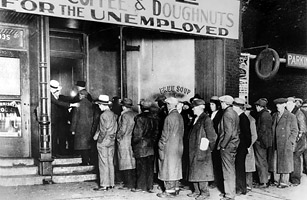
Careers can rise and fall on just one fateful statement, as mathematical economist Irving Fisher learned in 1929. "Stocks have reached what looks like a permanently high plateau," he confidently predicted. Three days later, the stock market plunged into a historic collapse, which led to mass unemployment, the Great Depression and a decade of gloom. Fisher believed that the market was inherently rational and efficient; in the months following the crash, he continued to assure investors and insisted that a recovery was just around the corner. Though the economy finally improved after World War II, Fisher's short-lived bubble was, unfortunately, far from the last the U.S. would experience.